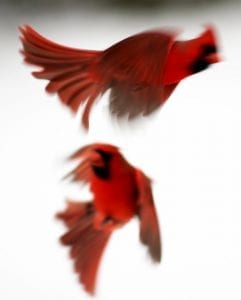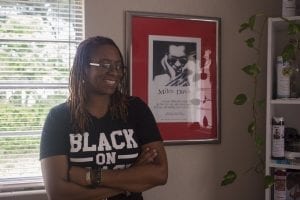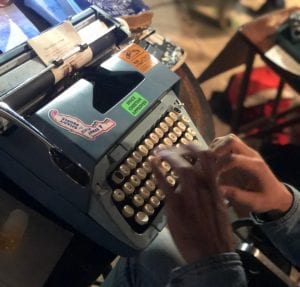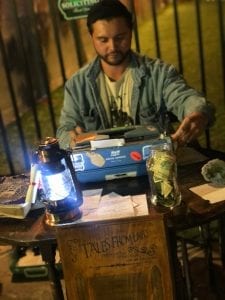December 18, 2019 | Curated by Maureen McDole
The Beachside Motel
By Daphne Taylor Street
. . .
The moment you think that you have the words to describe everything, you hear music. The sound of a trumpet off in the distance filled the air, painting it with brilliant colors; notes bouncing off of the waves, splashing onto the shore.
Veronica stood motionless. Her evening gown dusted in sand and salt sprayed on by the wind and the Gulf, and the translucent fabric clung to her — a violet second skin, shimmering under the stars.
“You match the surf!” a voice called out from behind her. “Look at you. Your dress sparkles like the waves,” and the voice was getting closer, but there was no image of him in the dark. Veronica looked down at her arms, and it was true, the violet shimmer of the fabric on her dress was a perfect match to the moonbeams dancing on the waves.

After a moment of silence, she turned, but no one was there. The buildings in the background were blacked out. It was three o’clock a.m., and not a soul seemed to be awake but her. Except, yards away was a beachside motel with a neon vacancy sign lit up out front, blinking in the dimly lit window of an office. The trumpet’s songs resumed in muted tones.
A lump rose up in Veronica’s throat. She felt like crying, but the tears wouldn’t come. She felt nauseous, angry, humiliated, defeated, and a wave of despondence overwhelmed her. The full bottle of wine she consumed on her own a mere hour ago seemed to lose its impact. The intoxication was no use in dulling the pain any longer, and Veronica fell into the sand, dry-eyed and strangled by her emotions. She sat alone gasping for air, clutching the sugary white sand pouring through her fingers.
Then, something broke. A sharp pain crescendoed in her head as if a glass had shattered and scratched the inside of her heart and mind and began shooting outward, tearing her flesh, just under the surface — she became cold. The beads of sweat all around her body bubbled to the surface and mixed with the cool droplets of sea spray while memories crashed in on her. Her own breath betrayed her, and all she could do was exhale deeply, sucking in sharp shallow breaths.
Her mind played out vivid frames of the evening on fast-forward, then landed on the slow, painfully long stretch of silence in the car ride to this unfamiliar motel.
“Oh, by the way, I’ve filed for divorce,” said Jason as he drove along the coastline.
“Um, wha..” Veronica turned to him quietly and confused.
“And I’ve moved our money. You won’t find it, so there’s no need for you to contest it. I think you have $12,000 in your checking account. I’ve left you with that. Thanks for agreeing to selling the house so quickly. This way, it’s all neat and clean. We don’t even need to talk past this point. Our attorneys will handle everything. See? It’s clean. You should be happy — I’ve made this pretty easy on you. Okay, here we are,” he pulled up to an old Florida beachside motel and stopped the car.
Veronica sat there staring at Jason, then whispered sheepishly, stuttering, “What?”
Jason twisted his neck around with his chiseled jaw clenched, eyes stern and black, glaring into hers filled with tears, and he said simply, “Get out.” She did, and he sped off. Veronica gathered herself up, and she walked to the motel office. No one seemed to be there; the door was locked, and no one answered as she pounded, just needing a place to rest.
She looked around and noticed a hammock near one of the motel windows. She figured she could pass out there until dawn, which was still hours away.
A sense of dead exhaustion overcame her, and she clung tightly to the old woven hammock and climbed into it, drifting off to a shallow sleep. The sound of the waves crashing over and over again against the surf took her mind to a place of uncommon stillness — an ethereal quiet hushed her aching spirit. A peace she hadn’t known since childhood. And she dreamed in soft colors.
About an hour lapsed, and consciousness swept in, waking her to a sharp pain in her thigh. Her plump flesh pressed uncomfortably against the strong ropes, she shifted her weight over to the left to relieve the pressure, but her foot got stuck. Trying to shake it free, her hand fell through another opening in the hammock, and she found herself twisted and tangled like a wild dolphin caught in an unforgiving net.
Veronica then thrust all of her weight — a solid 180 lbs. — onto one side, spinning her body, leaving her hovering over the sand, face down, still caught in the ropes. Her long blonde hair stuck to her face. The hammock seemed to have won the battle, and as far as she knew, it might have won the war.
No longer feeling peaceful, the relentless Florida heat returned with a vengeance, wrapping her in a blanket of thick humidity, she hung there, sweat leaking from every pore, her evening gown shrunk onto her flesh like plastic wrap.
Not a soul seemed to be awake; even moonstruck lovers had found their way indoors for the night. There wasn’t much hope for a rescue, and her handbag was yards away with her cell phone tucked safely inside. Veronica tried to fight back tears of frustration and discomfort, and she failed.
As she tried to wipe her now slimy nose, she managed to finally free her hand from the ropes, and it fell to the sand below and onto something that felt rubbery and cold beneath the surface.
Curious, she dusted off the sand covering the object. It was a hand—a dead, human hand, gray-ish and thick, with a gold Rolex strapped to its wrist, still ticking away.
Veronica screamed.

DaphneTaylorStreet.com
What goes into a Neighborhood
By Ian Lindsey
. . .

Buildings and the lives they harbor;
colorful humans that have not forgotten to smile
and grasp firmly & warmly as they greet each other.
Neighbors that turn the music up
and dance,
and turn the music down
and sleep. And drive slow to protect
the kids at play
those hunched over gardens
or ovens—baking extra to share
with the fixers and the breakers
those who have come to collect,
and those who have come to pay fees.
Take your shoes off in the grass
take your eyes off of the phones
know when it is time to sing—
and when it is time to applaud.
Remember to listen,
and to understand—
getting at what connects us all;
instead of what divides us. Think,
on the blessings that punctuate
the day. The drifting stillness
at night — when we feel safe
amongst these people with stakes
in shared space. Laugh often,
and look around from different angles
and oblique ways of knowing.
talk about struggle the way we talk about love;
speak about fruition the way we tell stories,
& hear on their triumph the way we listen to God.
Afternoon in the Woods

Strolled out into a break in the trees, where we can hear the rustling
whisper, imbuing each limb of the conifer—where the light touches
down, gracing the earth in truncated pocks like a baptismal font
tipped over, spilled across the land drying like a Rorschach:
exposing each contour where those before us stepped
into the alcove where the sun wedges through the canopy
tour en l’air each branch. This psithurism one act
carries us back to the time I stood in front of the mirror
puberty unfurling in patches on my face. You told
me not to shave sideways. Go up and down in swift motion
that won’t cut your skin, keep the whiskers ripe like sugar pinecones
caught in the somersault of the wind. I listened but still slashed
like early vowel phonetics.
A glistening crimson drips and splashes down to the porcelain:
bloody brushstrokes canvassed out like the beam of the sun
on afternoons
where we hear
the breeze
rattle
our memory.
Upham

The first time you walked the shoreline
where you come to watch the tide
crest up against the sand grains
held firmly in their place
by sea oats, tucked delicately
into the dunes. You looked out into that beaming horizon
for that green flash that signals
our youth returning to us
like so many nostalgic arcs
of the sun not stopping to linger.
And I think of the sum parts
Of my whole,
The deepness of my self
made up by these fragments
of memories,
granular,
small
like the sand
where you walk.
If you listen closely
you can hear the giggle
in the tradewinds,
see jubilance
in the shimmer of each wave
colliding into another
like a cracked geode. Feel the warmth
of the strong stock of woman
that beats from your mother
before you, and her mother before her.
If you lick at the salty air
you can taste the same brine
that permeated this land
when the first eon
berserked into existence,
then yawned like a tabby cat
on its belly.
Ian Lindsay on Instagram
Impulse Redux:
Mate for Life
By Sheree L. Greer
. . .
My bookstore had only been open for ten minutes when she glided inside. Her entrance barely moved the bamboo chimes above the door. She stopped in front of the poetry section, her hair an explosion of dark and light brown coils and curls. A stark white tank top glowed against her sable skin. I walked over and stood beside her. My stomach rumbled, but she didn’t seem to hear it.
“Can I help you?” I said.
“Nah, you probably don’t have…” Her eyes never left the shelf.
“Try me.”
She turned to me and smiled. “Under a Soprano Sky.”
“Sanchez.”
Her eyes lit up.
I shook my head. Her disappointment hung in the air like the smell of smoke.
“I can order it. Be here in about a week.”
“Sure. I’d like that.”
“Interesting. Most people just…”
“The internet.” she said, touching my arm. “This gives me a reason to make sure I come back.”
The touch set off a flutter in my stomach. Birds. Miniature ones. At least a dozen of them. Flying around my belly, perching on my organs. I cleared my throat.
“You don’t need a reason to come back,” I said, surprising myself. The birds shifted beneath my rib cage. The woman followed me to the front counter. I grabbed an order form from beside the register.
“What’s your name?”

She extended her hand over the counter and answered, “Jadene.” She looked down at the form, pulled back her hand and snorted softly. “Oh. J-A-D-E-N-E. Wow! You real old school.”
“It’s… I have a system.” I offered my hand. “I’m Deka.” Touching her hand riled up the birds. “It should be here in about five days,” I said, handing her a receipt.
Folding the thin carbon paper, she nodded. “Thanks. I’ll see you again soon.”
“Okay.” I looked down as she eased back from the counter to leave. Out of Jadene’s sight, my stomach protruded against my shirt, wings and heads pushing against my flesh.
Jadene came back the next day. She looked around the store. “Slow day?”
“Unfortunately,” I said. “And I’m closing soon.”
“You putting me out?”
The birds were back, their wings tickling my ribs and their beaks stabbing my intestines. I wanted her to stay so bad it hurt. I swallowed. “No.”
She smiled.
“But I am going to put you to work.”
Together, we straightened up the store. Through most of our tasks, she sang softly. The tender murmurs calmed the birds. But when she came over to help me with the fiction section, the birds went wild. Flaps, flutters and shivers, tickles and thumps from their wings, pricks and pokes from their beaks and feet. Pleasure and pain. A crush. Jadene handed me the books stacked on the floor and I slid them into place.
“You, uh, read a lot of poetry?” I asked.
“Yes, I do,” Jadine said.
Talking settled the birds.
“You write any?”
“I write Haikus but never let anyone read them.”
“Why not?”
“They’re all sad. Lonely.” Jadene sighed and stood up. “Now that I think of it, I only write haikus when I’m single.”
“Being single doesn’t have to be tragic.” I shelved the last book. “I could be single forever, as long as someone would kiss me every once in awhile.”
That’s when it happened.
She kissed me.
I kissed her back, shocking myself and stunning the birds. When we parted, I exhaled, and all the birds inside of me flew out of my mouth.
Jadene screamed. She stumbled away from me. “I’m… I’m… I’m sorry,” she said, waving the crimson birds away. They cooed and hovered overhead, then darted in a frenzy all around the store. “I, uh, I should go.” She hunched her head between her shoulders and ran toward the door, shooing away a few tiny blood red birds determined to make a nest of her afro.
I wanted to say something, but my mouth was filled with feathers.
Jadene didn’t return until her book arrived.
“Hey,” Jadene said, walking up to the counter. She glanced up at the ceiling and the tops of the shelves.
“They’re gone.” I dipped under the counter to get her book.
“Oh.” Jadene exhaled. “I, um, I didn’t mean to just… and I would’ve come back but…”
“Don’t worry about it,” I said. I slid the book toward her. “You want to check it out before I ring it up?”
Jadene started to speak, but just grabbed the book instead.
“The birds…” I ran my hands over my abdomen. “They were cardinals.”
Jadene looked up startled. She looked over her shoulder, checking the ceiling corners again. “You’re sure they’re gone?”
“Yeah, I’m sure.” I looked at her. Fear in her eyes. Her mouth turned down. Her hair pulled back — straight, tight and impersonal. “It’s too bad, you know. They… they mate for life.”
“Really?” Jadene nodded. “That’s… um… interesting.” She hurriedly pulled a twenty from her wallet and laid it on the counter.
“Why did you come for the book? You could have just chalked it up and…”
“I wanted to see you again. I felt like we had a connection, but then the birds and… I just… I wasn’t expecting that.”
“It’s okay. I understand.” I rang up the book, took the twenty, then held her change out to her. She reached for it slowly. When our hands touched, she reeled back, her eyes wide and mouth open.
“What?”
“My stomach…” She put a hand to her belly. “It feels like…”
“Feels like what?” I leaned forward and noticed sweat beading on her brow.
Jadene looked down as her shirt stretched in odd shapes. She looked up at me with tears in her eyes. Choking, she grabbed at her throat.
I ran around the counter to help her. Bent at the waist, she coughed and coughed, and amid hacking, a clump of wet, red feathers ejected from her mouth and landed on the floor.





